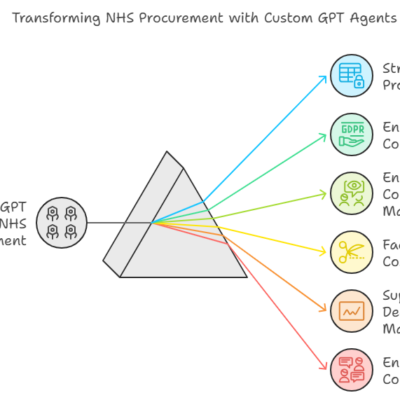The report, prepared by Ben Paxton and Nick Davies and published in September 2024, provides insights into the pressing need for reform and offers recommendations to enhance transparency, performance, and accountability in public procurement.
The Scope of UK Government Procurement
UK government procurement represents a significant proportion of public spending. With the government allocating more than £350 billion annually for goods, services, and infrastructure, procurement makes up nearly one-third of total public expenditure. This figure is comparable to the proportion of government spending on procurement seen across OECD countries, which averages around 29.7%.
However, UK procurement spending is heavily centralised, with 66% of it controlled by central government, a level that significantly exceeds the OECD average, where less than 40% of procurement is typically overseen by central authorities. Local government, meanwhile, is responsible for 48% of its overall expenditure on procurement, a proportion that has risen in recent years due to reductions in other areas of local spending, which leaves procurement representing a larger share of local budgets.
The UK government spent a total of £388 billion on procurement in 2022/23, a sum that dwarfs many key public services, including the NHS budget, and highlights the immense importance of ensuring value for money and accountability in public contracts. Yet, while procurement is essential for maintaining public services, national infrastructure, and defence, it has also been the source of several recent high-profile scandals.
Procurement Scandals and the Need for Reform
Government procurement has come under increased scrutiny due to a series of high-profile failures. The Horizon computer system, responsible for the wrongful prosecution of Post Office workers, stands out as one of the most significant recent procurement scandals. The faulty system led to the wrongful conviction of hundreds of sub-postmasters, causing immense personal and financial harm. Similarly, the VIP-lane scandal during the COVID-19 pandemic saw accusations of cronyism when some suppliers of personal protective equipment (PPE) were awarded contracts through a preferential procurement process without due diligence, leading to significant waste.
The Procurement Act 2023, passed under the government of Rishi Sunak, is seen as a pivotal opportunity to address the weaknesses exposed by these and other scandals. The Act is expected to introduce simplified regulations, greater transparency, and enhanced exclusion criteria to improve accountability in public procurement. However, there are concerns that the additional requirements introduced by the Act may impose further demands on already strained resources, adding complexity to an already intricate governance system.
Performance Metrics and Monitoring
One of the key challenges in government procurement is the misalignment of performance metrics with broader government objectives. As noted in the report, performance metrics used to assess supplier performance are often unclear, difficult to monitor, and sometimes outside the control of the supplier itself. Monitoring of these metrics is often carried out by junior staff with limited commercial expertise, which reduces the effectiveness of oversight.
The Procurement Act introduces new requirements for the publication of key performance indicators (KPIs) and supplier performance data. However, for these reforms to be successful, contracting authorities across all levels of government need to invest in improving the capacity and capability required to set and monitor these performance metrics. The Government Commercial Function (GCF) will need to provide training and support to help ensure that KPIs are relevant, transparent, and aligned with the government’s strategic objectives.
Accountability for Poor Performance
One of the major issues identified in the report is the lack of consequences for poor supplier performance. Despite existing grounds for excluding underperforming suppliers from future contracts, such exclusions are rarely used. The Procurement Act expands the criteria for supplier exclusion, but its implementation is likely to be hampered by the public sector’s dependence on certain key suppliers, particularly in markets where there is little competition.
To address this issue, the report recommends that the Cabinet Office conduct targeted reviews of the suppliers most relied upon by the public sector and clarify how they could be feasibly added to the debarment list. Ministers should also commission deep-dive reviews into public sector markets where a lack of competition may make excluding suppliers difficult. In some cases, insourcing services back into the public sector may offer a better alternative to continuing to rely on underperforming external suppliers.
Transparency and Data Quality
Transparency is a fundamental aspect of ensuring accountability in government procurement, yet the quality of procurement data available is often poor. The report highlights that the lack of reliable data limits oversight of government spending, making it difficult to assess whether contracts are delivering value for money. The Procurement Act provides an opportunity to address this issue by requiring increased reporting on procurement activities and the creation of a central digital platform to consolidate procurement data.
However, the success of these transparency reforms depends on the ability of public organisations to collect and report high-quality data. The report calls on the Treasury to update the Managing Public Money guidelines to make accounting officers responsible for maintaining and publishing accurate procurement data. Improved transparency could lead to better competition, lower costs, and improved supplier performance.
External Scrutiny and Parliamentary Oversight
While external scrutiny by bodies such as the National Audit Office (NAO) and the Commons Public Accounts Committee (PAC) plays an important role in improving behaviour in procurement, their effectiveness is often limited by the tick-box approach taken by government departments in response to their recommendations. The report suggests that the PAC should continue to follow up on whether its recommendations are implemented and request regular updates on progress toward meeting the transparency requirements set out in the Procurement Act.
Policies and Controls: Streamlining Governance
Policies and controls are essential for ensuring that procurement is aligned with government priorities and follows appropriate processes. However, too many layers of governance can obscure accountability and make the public sector a less attractive client for suppliers. The report points out that governance complexity can lead to delays and inefficiencies in procurement decisions.
The Procurement Act aims to simplify procurement processes by consolidating more than 350 different procurement regulations into a single legislative framework. The National Procurement Policy Statement (NPPS), which will be updated under the new Labour government, offers an opportunity to set a clear strategic direction for public procurement. The report recommends that the Cabinet Office update the NPPS to reflect Labour’s broader policy goals, while also conducting a comprehensive review of existing procurement policies to ensure that they are aligned with these priorities and do not unnecessarily complicate procurement processes.
Capability and Capacity in Government Procurement
The report acknowledges that there have been significant improvements in government procurement capability in recent years, particularly through the creation of a dedicated commercial profession within the civil service. However, there are still significant capacity issues, particularly in local government and arm’s-length bodies (ALBs), where procurement teams are often under-resourced and lack the commercial expertise necessary to manage complex contracts effectively.
The successful implementation of the Procurement Act will require additional capacity in government procurement teams, particularly for managing the increased reporting and transparency requirements. The report calls on the Government Commercial Function to set out detailed plans for addressing these resource gaps and ensuring that all staff managing contracts receive appropriate training and support.
The Role of Insourcing in Improving Accountability
The report also discusses the potential for insourcing services as a way to improve accountability and reduce reliance on underperforming external suppliers. Insourcing, which involves bringing services that have been outsourced back under direct public sector control, is a key area of focus for the Labour Party. With IT contracts worth £23 billion and management consultancy contracts worth £5 billion set to expire over the next few years, there are significant opportunities to bring some of these services back in-house.
Previous examples of successful insourcing, such as the DVLA‘s decision to bring IT services in-house, suggest that this approach can lead to substantial cost savings and improved service delivery. However, the report also notes that insourcing is not always a feasible solution, particularly in areas where the public sector lacks the necessary expertise or capacity to take over service delivery.
Conclusion
The Procurement Act 2023 presents a critical opportunity to improve accountability, transparency, and performance in UK government procurement. By addressing the weaknesses highlighted in the report—such as poor data quality, unclear performance metrics, and a lack of consequences for poor supplier performance—the government can ensure that public procurement delivers better value for money and serves the needs of citizens more effectively.
However, these reforms will require significant investment in building the capacity and capability of public sector procurement teams, as well as a concerted effort to streamline governance processes and align procurement policies with broader government priorities. Only by addressing these challenges can the government restore public trust in its ability to manage procurement effectively and avoid future scandals like those seen in recent years.
The full report, including charts and detailed data, can be accessed here.








